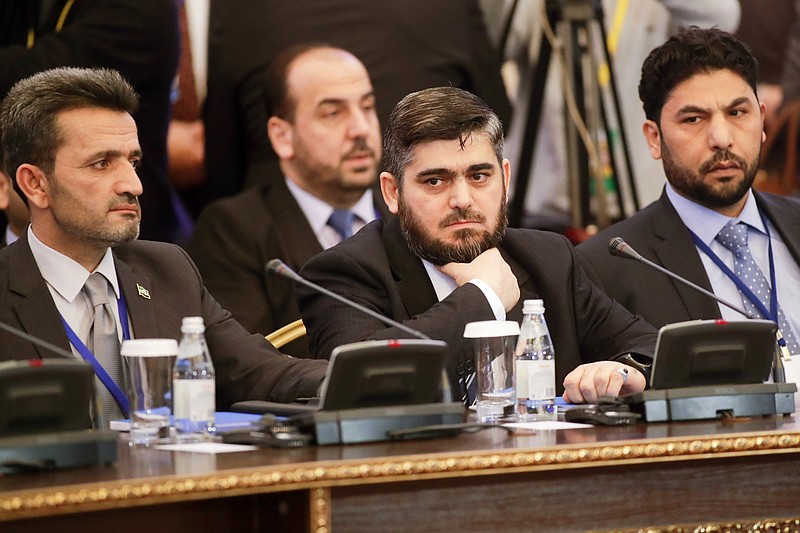BEIRUT (AP) - Regardless of whether the talks in the freezing Kazakh capital provide a path forward for peace in Syria, there was one definite and tangible outcome: The country's ragtag army of rebels has found a place at the negotiating table, literally.
For the first time, more than a dozen rebel representatives were invited to attend the two-day talks in Astana, sitting in the same room briefly across from government officials, their sworn enemies who refer to them as terrorists.
Shedding their military fatigues, rebel fighters, most of them officers who defected from the Syrian army, mingled with diplomats and international journalists, haggled in closed-door meetings and huddled over maps with a Russian presidential envoy to discuss the outlines of a cease-fire and humanitarian corridors.
At the end of the two-day meeting, they were urged to consider attending the next round of political talks to be held in Geneva next month. And most importantly, some say, the Russia sponsors promised to respond to their demands in a week's time.
Capt. Saeed Naqrash, a 34-year-old defected army officer who served in an artillery unit before the war, sat behind the head of the rebel delegation in the opening session that briefly brought the government and rebels together. He said for the first time in five years, he wore his suits. Naqrash's rebel unit was besieged in Daraya, a suburb of Damascus, for four years, surviving a punishing government bombing campaign before surrendering and evacuating to the rebel stronghold of Idlib.
"The meetings with the Russians were most important," said Naqrash, of the Islam Martyrs brigade. "In closed meetings, we got the reassurances" they needed from a direct party to the conflict.
During years of internationally sponsored talks seeking a resolution to the grueling war, now in its sixth year, none have given the armed opposition such a platform.
A motley crew of fighters, Syria's armed opposition has struggled for years to unify behind a leadership, political or military. Efforts to create military councils and operational rooms were always short-lived and often self-destructed. With the flux of foreign fighters to an increasingly complex battlefield, the Syrian government labeled all the armed groups "terrorists" backed by foreign enemies. So, previous negotiations focused on the political opposition, equally diverse and fragmented, but with little sway on the battlefields.
Those attending the Astana talks included some of the most powerful rebel factions, mostly operating in northern Syria. The majority were part of the Free Syrian Army, an early rebel umbrella group that was a conduit for western and regional assistance and later splintered into dozens of factions. Some of them, like the Alezzah Army, are CIA-vetted and have received guided missiles in the past. Others, like the Sultan Murad Brigade, are completely beholden to Turkey, while the Islam Army is considered close to Saudi Arabia. All are conservative, some more ideologically tied to one of the region's established traditional Islamist groups, the Muslim Brotherhood.
An article in the Syrian pro-government Al-Thawra newspaper Tuesday divided the rebel attendees into al-Qaida-linked or Muslim Brotherhood-affiliated categories.
Naqrash shied from journalists. His faction has been celebrated as survivors who lost badly and gave up Daraya to government forces. During the closed meeting, Mohammed Alloush, the head of the rebel delegation, pointed him out to participants to debunk government allegations that the rebels are terrorists.
"Those officers from the Free Syrian Army were state officers," Alloush said in a leaked audio from the meeting. "Calling them terrorists reinforces the lack of trust between us and the ruling authority."
The head of Syria's government delegation repeatedly referred to the rebels in Astana as representatives of "terrorist armed groups."
"This has been extremely painful for us to sit in the same room with other Syrians linked to foreign agendas and working for foreign powers. Some of them have committed terrorist acts," said Bashar Ja'afari, Syria's U.N. ambassador.
Rebel commander Capt. Mustafa Maarati, said he consulted with U.N. diplomats before last year's Geneva talks but was not invited.
This time, "the delegation is headed by officers because cease-fire talks need maps and monitoring mechanisms," said Maarati, a defecting army officer from the U.S.-backed Alezzah Army, said.
The rebel factions may have briefly shared a table with the government representatives, but they ensured such encounters were limited.
They arrived late to the opening ceremony and left early to avoid rubbing shoulders with government officials. When the host country invited them to a luncheon in a hall that included the government delegation, they politely declined, in writing.
"We sat in the same room (during the opening session) as a courtesy to the host," said Maarati.
